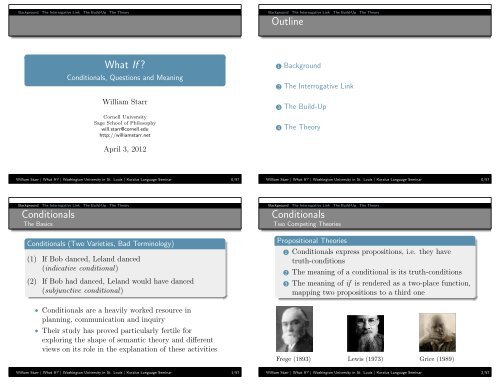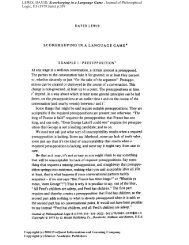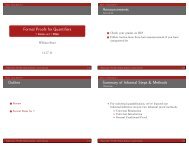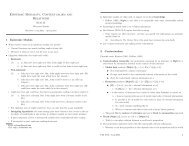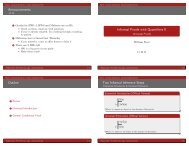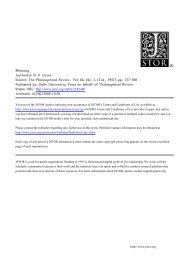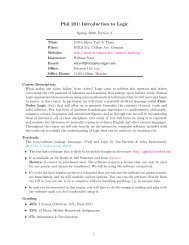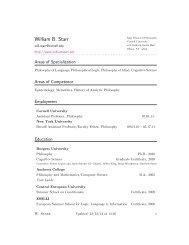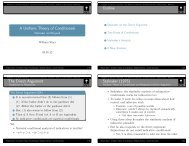What If? - Will Starr
What If? - Will Starr
What If? - Will Starr
Create successful ePaper yourself
Turn your PDF publications into a flip-book with our unique Google optimized e-Paper software.
Background The Interrogative Link The Build-Up The Theory<br />
Background The Interrogative Link The Build-Up The Theory<br />
Outline<br />
<strong>What</strong> <strong>If</strong> ?<br />
Conditionals, Questions and Meaning<br />
<strong>Will</strong>iam <strong>Starr</strong><br />
Cornell University<br />
Sage School of Philosophy<br />
will.starr@cornell.edu<br />
http://williamstarr.net<br />
1 Background<br />
2 The Interrogative Link<br />
3 The Build-Up<br />
4 The Theory<br />
April 3, 2012<br />
<strong>Will</strong>iam <strong>Starr</strong> | <strong>What</strong> <strong>If</strong> ? | Washington University in St. Louis | Koralus Language Seminar 0/57<br />
<strong>Will</strong>iam <strong>Starr</strong> | <strong>What</strong> <strong>If</strong> ? | Washington University in St. Louis | Koralus Language Seminar 0/57<br />
Background The Interrogative Link The Build-Up The Theory<br />
Conditionals<br />
The Basics<br />
Conditionals (Two Varieties, Bad Terminology)<br />
(1) <strong>If</strong> Bob danced, Leland danced<br />
(indicative conditional)<br />
(2) <strong>If</strong> Bob had danced, Leland would have danced<br />
(subjunctive conditional)<br />
• Conditionals are a heavily worked resource in<br />
planning, communication and inquiry<br />
• Their study has proved particularly fertile for<br />
exploring the shape of semantic theory and different<br />
views on its role in the explanation of these activities<br />
Background The Interrogative Link The Build-Up The Theory<br />
Conditionals<br />
Two Competing Theories<br />
Propositional Theories<br />
1 Conditionals express propositions, i.e. they have<br />
truth-conditions<br />
2 The meaning of a conditional is its truth-conditions<br />
3 The meaning of if is rendered as a two-place function,<br />
mapping two propositions to a third one<br />
Frege (1893) Lewis (1973) Grice (1989)<br />
<strong>Will</strong>iam <strong>Starr</strong> | <strong>What</strong> <strong>If</strong> ? | Washington University in St. Louis | Koralus Language Seminar 1/57<br />
<strong>Will</strong>iam <strong>Starr</strong> | <strong>What</strong> <strong>If</strong> ? | Washington University in St. Louis | Koralus Language Seminar 2/57
Background The Interrogative Link The Build-Up The Theory<br />
Conditionals<br />
Two Competing Theories<br />
Background The Interrogative Link The Build-Up The Theory<br />
The Debate<br />
Between Propositional and Suppositional Theories<br />
Suppositional Theories<br />
1 The assertion of a conditional does not involve the<br />
assertion of a conditional proposition<br />
2 Instead, the if -clause marks a supposition under which<br />
the consequent alone is asserted<br />
• This debate ranges over an array of phenomena<br />
• It remains hotly contested (Bennett 2003; Stalnaker<br />
2005; Lycan 2006; Edgington 2008)<br />
• It is a specific instance of a broader debate about the<br />
nature of meaning<br />
The Propositional View A sentence’s meaning consists in<br />
the way it represents the world as being<br />
The Suppositional View A sentence’s meaning consists in<br />
the role it plays in communicative and/or<br />
cognitive acts (assertion, acceptance, etc.)<br />
von Wright (1957) Adams (1975) Edgington (1995)<br />
<strong>Will</strong>iam <strong>Starr</strong> | <strong>What</strong> <strong>If</strong> ? | Washington University in St. Louis | Koralus Language Seminar 3/57<br />
<strong>Will</strong>iam <strong>Starr</strong> | <strong>What</strong> <strong>If</strong> ? | Washington University in St. Louis | Koralus Language Seminar 4/57<br />
Background The Interrogative Link The Build-Up The Theory<br />
The Plan<br />
In Five Steps<br />
Background The Interrogative Link The Build-Up The Theory<br />
The Interrogative Link<br />
<strong>If</strong> in Interrogative Environments<br />
1 Introduce a phenomenon involving if that frustrates<br />
both suppositional and propositional theories<br />
2 Provide an intuitive account of the meaning of<br />
conditionals which captures this phenomenon<br />
3 Describe a formal implementation of this account<br />
4 Explain how the underlying concept of meaning unifies<br />
the different approaches to meaning embodied by<br />
propositional and suppositional theories<br />
5 Describe how this implementation also combines the<br />
benefits of those two kinds of theories<br />
Under Interrogative Verbs (Harman 1979)<br />
(3) Albert wondered if Mabel loved John<br />
(4) Mabel asked if John was going to the party<br />
But, also:<br />
Interrogative Equatives<br />
(5) The future is coming. The question is if we will be<br />
ready for it.<br />
<strong>Will</strong>iam <strong>Starr</strong> | <strong>What</strong> <strong>If</strong> ? | Washington University in St. Louis | Koralus Language Seminar 5/57<br />
<strong>Will</strong>iam <strong>Starr</strong> | <strong>What</strong> <strong>If</strong> ? | Washington University in St. Louis | Koralus Language Seminar 6/57
Background The Interrogative Link The Build-Up The Theory<br />
The Interrogative Link<br />
The Problem<br />
Background The Interrogative Link The Build-Up The Theory<br />
The Interrogative Link<br />
Skeptical Gambit 1<br />
Interrogative <strong>If</strong> s<br />
(3) Albert wondered if Mabel loved John<br />
(4) Mabel asked if John was going to the party<br />
(5) The future is coming. The question is if we will be<br />
ready for it.<br />
The Problem Posed by (3)-(5)<br />
1 No binary operation on truth-values or propositions<br />
2 No suppositional speech act<br />
Skeptical Reply:<br />
• Maybe the co-occurance of if in conditionals and<br />
(3)-(5) is a linguistic accident<br />
• Like use of bank for two very different things<br />
Response:<br />
• It’s very uncommon for languages to use the same word<br />
for financial institutions and the land alongside a river<br />
• But it’s quite common, even across unrelated<br />
languages, to use homophonous words in interrogatives<br />
and conditional antecedents<br />
<strong>Will</strong>iam <strong>Starr</strong> | <strong>What</strong> <strong>If</strong> ? | Washington University in St. Louis | Koralus Language Seminar 7/57<br />
<strong>Will</strong>iam <strong>Starr</strong> | <strong>What</strong> <strong>If</strong> ? | Washington University in St. Louis | Koralus Language Seminar 8/57<br />
Background The Interrogative Link The Build-Up The Theory<br />
The Interrogative Link<br />
Across Languages<br />
Background The Interrogative Link The Build-Up The Theory<br />
The Interrogative Link<br />
Advertising Conditionals<br />
The Link Beyond English<br />
• Romance Langauges (Kayne 1991: §2.2)<br />
• Bulgarian & Slavics (Bhatt & Pancheva 2006: 653)<br />
• Hebrew (Roger Schwarzschild p.c.)<br />
• Hua, Mayan Tzotzil, Tagalog (Haiman 1978: 570)<br />
• ASL and LIS (Pyers & Emmorey 2008, Belletti p.c.)<br />
• Also Embick & Iatridou (1994) on conditional inversion<br />
• Also Austin (1956: 212) and Grice (1989: 78)<br />
(6) Do you need an efficient car? (Then) Honda has the<br />
vehicle for you<br />
(7) Single? You haven’t visited Match.com<br />
(8) Art thou bound unto a wife? Seek not to be loosed.<br />
Art thou loosed from a wife? Seek not a wife.<br />
(Corinthians 7:27, cited by Jespersen 1940: 374)<br />
• Jespersen (1940: 374): the 2nd sentence of (8) is issued<br />
in a context where an affirmative answer (yes) to the<br />
preceding question is being supposed<br />
<strong>Will</strong>iam <strong>Starr</strong> | <strong>What</strong> <strong>If</strong> ? | Washington University in St. Louis | Koralus Language Seminar 9/57<br />
<strong>Will</strong>iam <strong>Starr</strong> | <strong>What</strong> <strong>If</strong> ? | Washington University in St. Louis | Koralus Language Seminar 10/57
Background The Interrogative Link The Build-Up The Theory<br />
Enriching the Suppositional Process<br />
Ramsey’s Test & Hypothetical Information Change<br />
The Ramsey Test (Ramsey 1931: 247)<br />
“<strong>If</strong> two people are arguing ‘<strong>If</strong> p, will q?’ and are both in<br />
doubt as to p, they are adding p hypothetically to their<br />
stock of knowledge, and arguing on that basis about q. . . ”<br />
• This test may be enriched to reflect the interrogative<br />
contribution of if p<br />
The Enriched Ramsey Test<br />
<strong>If</strong> two people are arguing ‘<strong>If</strong> p, will q?’, they are adding p?<br />
hypothetically to the stock issues guiding their inquiry, and<br />
arguing on the basis of a hypothetical affirmative resolution<br />
of that issue about q<br />
Background The Interrogative Link The Build-Up The Theory<br />
The Enriched Ramsey Test<br />
A Rough Paraphrase<br />
(9) <strong>If</strong> Bob danced, Leland danced<br />
(9 ′ ) a. Suppose we are wondering if Bob danced. . .<br />
b. . . . and it turns out that he did.<br />
c. Then it will follow that Leland danced.<br />
• This states the function of a conditional in terms of its<br />
contribution to the evolving body of information and<br />
issues that characterizes a conversation or inquiry<br />
• <strong>If</strong> this statement can serve as a semantics, it holds<br />
promise for capturing the conditional-interrogative link<br />
<strong>Will</strong>iam <strong>Starr</strong> | <strong>What</strong> <strong>If</strong> ? | Washington University in St. Louis | Koralus Language Seminar 11/57<br />
<strong>Will</strong>iam <strong>Starr</strong> | <strong>What</strong> <strong>If</strong> ? | Washington University in St. Louis | Koralus Language Seminar 12/57<br />
Background The Interrogative Link The Build-Up The Theory<br />
A Plan<br />
For the Immediate Future<br />
1 Adopt a convenient model of information<br />
2 Describe an approach to semantics that deals in<br />
‘transitions between bodies of information’<br />
3 Scale up this model to capture:<br />
1 Not only information but issues (i.e. questions)<br />
2 Hypothetical changes to this body of info & issues<br />
4 Use a semantics of this variety to give an analysis of<br />
conditionals<br />
• It will parallel the paraphrase of (9) given in (9 ′ )<br />
Background The Interrogative Link The Build-Up The Theory<br />
Information<br />
A Convenient Model<br />
The Possible Worlds Model of Information<br />
• Think of a set of possible worlds as distinguishing ways<br />
the world might be (possibilities in the set) from ways<br />
it isn’t (possibilities excluded from the set)<br />
• This is what information (or a ‘proposition’) does<br />
• This view on the nature of<br />
content is not required, but is<br />
convenient to operate with<br />
• Truth Conditional Semantics:<br />
pair each sentence φ with a<br />
proposition φ<br />
Stalnaker (1984)<br />
<strong>Will</strong>iam <strong>Starr</strong> | <strong>What</strong> <strong>If</strong> ? | Washington University in St. Louis | Koralus Language Seminar 13/57<br />
<strong>Will</strong>iam <strong>Starr</strong> | <strong>What</strong> <strong>If</strong> ? | Washington University in St. Louis | Koralus Language Seminar 14/57
Background The Interrogative Link The Build-Up The Theory<br />
Information<br />
A Convenient Model<br />
Background The Interrogative Link The Build-Up The Theory<br />
Information<br />
The Convenient Model Meets Truth-Conditonal Semantics<br />
Start with a space of possibilities W = {w 1 , w 2 , w 3 , w 4 }<br />
• Cube = {w 1 , w 2 }<br />
(‘Cube’: a is a cube)<br />
w 1 w 2<br />
w 1 w 2<br />
w 3 w 4<br />
w 3 w 4<br />
<strong>Will</strong>iam <strong>Starr</strong> | <strong>What</strong> <strong>If</strong> ? | Washington University in St. Louis | Koralus Language Seminar 15/57<br />
<strong>Will</strong>iam <strong>Starr</strong> | <strong>What</strong> <strong>If</strong> ? | Washington University in St. Louis | Koralus Language Seminar 16/57<br />
Background The Interrogative Link The Build-Up The Theory<br />
Information<br />
The Convenient Model Meets Truth-Conditonal Semantics<br />
Background The Interrogative Link The Build-Up The Theory<br />
Information Change and Semantics<br />
Two Views<br />
• ¬Cube = W − Cube = {w 3 , w 4 }<br />
w 1 w 2<br />
w 3 w 4<br />
• Everybody agrees that conversation takes place against<br />
an ever-changing background of information<br />
• Call it c for the contextual possibilities/info<br />
• Classic models: Stalnaker (1978), Lewis (1979)<br />
Classical Picture Semantics delivers propositions and<br />
pragmatics provides rules for changing<br />
background information<br />
Dynamic Picture Semantics operates directly on background<br />
information<br />
In Short: meaning is information vs. meaning is<br />
information change potential<br />
<strong>Will</strong>iam <strong>Starr</strong> | <strong>What</strong> <strong>If</strong> ? | Washington University in St. Louis | Koralus Language Seminar 17/57<br />
<strong>Will</strong>iam <strong>Starr</strong> | <strong>What</strong> <strong>If</strong> ? | Washington University in St. Louis | Koralus Language Seminar 18/57
Background The Interrogative Link The Build-Up The Theory<br />
Information<br />
The Convenient Model Meets a Different Kind of Semantics<br />
Informational Dynamic Semantics<br />
1 Assign each φ a function [φ] characterizing how it<br />
changes the information embodied by c: c[φ] = c ′<br />
2 Think of this information as a way of tracking the<br />
agent’s current state of mind<br />
3 [φ] is the characteristic role that φ plays in changing<br />
an agent’s mental states<br />
Background The Interrogative Link The Build-Up The Theory<br />
Informational Dynamic Semantics<br />
For Epistemic Might (Veltman 1996)<br />
• c[Might(Cube)] = {w ∈ c | c[Cube] ≠ ∅} ‘Test’<br />
= c or ∅<br />
• c = {w 1 , w 4 }[Might(Cube)] = ?<br />
• {w 1 , w 4 }[Cube] =<br />
Formal Inspirations: Pratt (1976); Heim (1982); Veltman (1996)<br />
The Question<br />
Do some sentences effect c in ways that can’t be modeled as<br />
simply adding a proposition to it (i.e. c ∩ φ)?<br />
w 1 w 4<br />
c<br />
<strong>Will</strong>iam <strong>Starr</strong> | <strong>What</strong> <strong>If</strong> ? | Washington University in St. Louis | Koralus Language Seminar 19/57<br />
<strong>Will</strong>iam <strong>Starr</strong> | <strong>What</strong> <strong>If</strong> ? | Washington University in St. Louis | Koralus Language Seminar 20/57<br />
Background The Interrogative Link The Build-Up The Theory<br />
Informational Dynamic Semantics<br />
For Epistemic Might (Veltman 1996)<br />
Background The Interrogative Link The Build-Up The Theory<br />
Informational Dynamic Semantics<br />
For Epistemic Might (Veltman 1996)<br />
• c[Might(Cube)] = {w ∈ c | c[Cube] ≠ ∅}<br />
• c = {w 1 , w 4 }[Might(Cube)] = ?<br />
• {w 1 , w 4 }[Cube] = {w 1 } ≠ ∅<br />
• c[Might(Cube)] = {w ∈ c | c[Cube] ≠ ∅}<br />
• c = {w 1 , w 4 }[Might(Cube)] = c<br />
• {w 1 , w 4 }[Cube] = {w 1 } ≠ ∅<br />
w 1<br />
w 1 w 4<br />
c ′ = c<br />
<strong>Will</strong>iam <strong>Starr</strong> | <strong>What</strong> <strong>If</strong> ? | Washington University in St. Louis | Koralus Language Seminar 21/57<br />
<strong>Will</strong>iam <strong>Starr</strong> | <strong>What</strong> <strong>If</strong> ? | Washington University in St. Louis | Koralus Language Seminar 22/57
Background The Interrogative Link The Build-Up The Theory<br />
Informational Dynamic Semantics<br />
Semantic Concepts<br />
Support<br />
c φ ⇐⇒ c[φ] = c<br />
Dynamic Consequence<br />
φ 1 , . . . , φ n ψ ⇐⇒ c[φ 1 ] · · · [φ n ] ψ<br />
Truth in w (<strong>Starr</strong> 2010: Ch.1)<br />
w φ ⇐⇒ {w}[φ] = {w}<br />
Propositions<br />
φ = {w | w φ}<br />
Background The Interrogative Link The Build-Up The Theory<br />
Informational Dynamic Semantics<br />
The Question<br />
The Question<br />
Do some sentences effect c in ways that can’t be modeled as<br />
simply adding a proposition to it (i.e. c ∩ φ)?<br />
1 One Answer: Yes, namely Might(p).<br />
(Veltman 1996: §2)<br />
2 My Answer: Yes, namely (if φ) ψ, and in two ways<br />
• First, conditionals impact c in a way that can’t be<br />
captured as c ∩ (if φ) ψ<br />
• Second, articulating the compositional structure of<br />
conditionals demands the dynamic resources<br />
• I’ll come back to the first way shortly<br />
<strong>Will</strong>iam <strong>Starr</strong> | <strong>What</strong> <strong>If</strong> ? | Washington University in St. Louis | Koralus Language Seminar 23/57<br />
<strong>Will</strong>iam <strong>Starr</strong> | <strong>What</strong> <strong>If</strong> ? | Washington University in St. Louis | Koralus Language Seminar 24/57<br />
Background The Interrogative Link The Build-Up The Theory<br />
Semantics<br />
Informational Dynamic Semantics vs. Truth-Conditional Semantics<br />
• Regardless of ‘The Question’, the dynamic view is<br />
more general in one clear way<br />
• Dynamic meanings are the characteristic role a<br />
sentence plays in changing mental states<br />
• There may be more to it than informational effects<br />
• There’s more to mental states than their<br />
informational content (desires, attention, questions)<br />
• My semantics exploits this to build an interrogative<br />
semantics for if into a semantics for conditionals<br />
Background The Interrogative Link The Build-Up The Theory<br />
The Semantics of Interrogatives<br />
Hamblin’s Picture<br />
Hamblin’s (1958) Picture (Also Higginbotham 1996)<br />
1 Knowing the meaning of an interrogative is knowing<br />
what would count as an answer to it<br />
(10) a. Did Bob dance?<br />
b. Yes, Bob danced (affirmative answer)<br />
c. No, Bob didn’t dance (negative answer)<br />
2 To ask or wonder is to bear a certain relation to a set<br />
of these alternative propositions<br />
On Answerhood Conditions (Hamblin 1973)<br />
• Yes/no interrogatives: ?p = {p, ¬p}<br />
• if p is a yes/no interrogative, so: if p = {p, ¬p}<br />
<strong>Will</strong>iam <strong>Starr</strong> | <strong>What</strong> <strong>If</strong> ? | Washington University in St. Louis | Koralus Language Seminar 25/57<br />
<strong>Will</strong>iam <strong>Starr</strong> | <strong>What</strong> <strong>If</strong> ? | Washington University in St. Louis | Koralus Language Seminar 26/57
Background The Interrogative Link The Build-Up The Theory<br />
Information and Issues<br />
Incorporating Hamblin’s Picture<br />
Issues<br />
1 Thought and talk happen against a background of<br />
information and issues<br />
(Roberts 2004; Schaffer 2005; Groenendijk 2006; Yalcin 2008)<br />
2 Issues are clusters of alternative propositions<br />
• Open alternatives that the agents are<br />
concerned with deciding between<br />
3 Formally: a division of c into disjoint subsets<br />
• Interrogative operators — e.g. (? · ), (if · ) — don’t<br />
change background information, but rather, issues<br />
• I.e. ?p partitions c into the p-worlds and the ¬p-worlds<br />
Background The Interrogative Link The Build-Up The Theory<br />
Information and Issues<br />
The Effect of an Interrogative Operator<br />
C = {c} = { {w 1 , w 2 , w 3 , w 4 } }[?Cube] =<br />
w 1 w 2<br />
w 3 w 4<br />
C = {c}<br />
<strong>Will</strong>iam <strong>Starr</strong> | <strong>What</strong> <strong>If</strong> ? | Washington University in St. Louis | Koralus Language Seminar 27/57<br />
<strong>Will</strong>iam <strong>Starr</strong> | <strong>What</strong> <strong>If</strong> ? | Washington University in St. Louis | Koralus Language Seminar 28/57<br />
Background The Interrogative Link The Build-Up The Theory<br />
Information and Issues<br />
The Effect of an Interrogative Operator<br />
C = {c} = { {w 1 , w 2 , w 3 , w 4 } }[?Cube] = { {w 1 , w 2 }, {w 3 , w 4 } }<br />
w 1 w 2<br />
w 3 w 4<br />
Background The Interrogative Link The Build-Up The Theory<br />
Information and Issues<br />
Wondering <strong>If</strong><br />
Jay wonders if a is a cube: Wonder(Jay, (if Cube))<br />
• Eliminates each world w where the issues and<br />
information representing Jay’s doxastic state C w J<br />
doesn’t already contain the issue that would be raised<br />
by (if Cube)<br />
{c 0 , . . . , c n }[Wonders(Jay, (if Cube))] =<br />
{ {w ∈ c 0 | C w J [(if Cube)] = C w J }, . . . ,<br />
{w ∈ c n | C w J [(if Cube)] = C w J } }<br />
The Upshot: if has an interrogative semantics, just like ?<br />
C ′<br />
<strong>Will</strong>iam <strong>Starr</strong> | <strong>What</strong> <strong>If</strong> ? | Washington University in St. Louis | Koralus Language Seminar 29/57<br />
<strong>Will</strong>iam <strong>Starr</strong> | <strong>What</strong> <strong>If</strong> ? | Washington University in St. Louis | Koralus Language Seminar 30/57
Background The Interrogative Link The Build-Up The Theory<br />
Hypothetical Additions<br />
Logical Tourism<br />
• Information and issues are not only taken for granted<br />
in conversation and inquiry<br />
• Agents routinely entertain certain enrichments of the<br />
information and issues they are taking for granted<br />
• ‘Virtual information’ so to speak<br />
• Acts like supposition introduce these enrichments; the<br />
speech acts which follow may exploit what’s<br />
entertained in addition to what’s taken for granted<br />
• The real virtuosity: the ways that what’s entertained<br />
can be related to what’s accepted<br />
Background The Interrogative Link The Build-Up The Theory<br />
States of Inquiry<br />
States of Inquiry and Hypothetical Change<br />
Proposal: represent hypothetical change via states of inquiry<br />
Let s be a state of inquiry — state for short<br />
s<br />
c<br />
−−→<br />
state<br />
change<br />
−−−−→<br />
s ↓ p<br />
c<br />
c[p]<br />
Figure: Supposing p<br />
1 s = 〈c〉: nothing entertained<br />
2 s ↓ p = 〈c, 〈c[p]〉〉: c[p] is<br />
entertained<br />
3 Call s ↓ p Subordination<br />
(Related proposal: Kaufmann 2000)<br />
<strong>Will</strong>iam <strong>Starr</strong> | <strong>What</strong> <strong>If</strong> ? | Washington University in St. Louis | Koralus Language Seminar 31/57<br />
<strong>Will</strong>iam <strong>Starr</strong> | <strong>What</strong> <strong>If</strong> ? | Washington University in St. Louis | Koralus Language Seminar 32/57<br />
Background The Interrogative Link The Build-Up The Theory<br />
Two More Operations<br />
For Suppositional Discourse and Reasoning<br />
Relevant moves that exploit what’s entertained:<br />
Elaboration: s ⇓ q<br />
Continues enriching the supposition itself, e.g.<br />
〈 c, 〈c[p]〉 〉 ⇓ q = 〈 c, 〈c[p][q]〉 〉.<br />
Conclusion: s ↑ q<br />
Relates what’s entertained to what’s accepted via an<br />
entailment test. Let s = 〈 c, 〈c[p]〉 〉:<br />
• <strong>If</strong> c[p] (what’s entertained) entails q, c remains as is<br />
• Otherwise, something actually contradictory has been<br />
proposed, i.e. we are brought to: 〈∅, 〈c〉〉<br />
s ↑ q = 〈{w ∈ c | c[p] q}〉, 〈c[p][q]〉<br />
Background The Interrogative Link The Build-Up The Theory<br />
The Theory<br />
Based on the Paraphrase<br />
• Everything is in place to specify the meaning of a<br />
conditional in terms of how it changes a state:<br />
s[(if φ) ψ] = s ′<br />
(9) <strong>If</strong> Bob danced, Leland danced<br />
(9 ′ ) a. Suppose we are wondering if Bob danced. . .<br />
b. . . . and it turns out that he did.<br />
c. Then it will follow that Leland danced.<br />
1 Subordinated question: s ↓ if p<br />
2 Elaborated yes-answer: (s ↓ if p) ⇓ p<br />
3 Concluded consequent: ((s ↓ if p) ⇓ p) ↑ q<br />
<strong>Will</strong>iam <strong>Starr</strong> | <strong>What</strong> <strong>If</strong> ? | Washington University in St. Louis | Koralus Language Seminar 33/57<br />
<strong>Will</strong>iam <strong>Starr</strong> | <strong>What</strong> <strong>If</strong> ? | Washington University in St. Louis | Koralus Language Seminar 34/57
Background The Interrogative Link The Build-Up The Theory<br />
The Theory<br />
In Pictures<br />
Background The Interrogative Link The Build-Up The Theory<br />
The Theory<br />
Official Version<br />
s[(if φ) ψ] = ((s ↓ (if φ)) ⇓ φ) ↑ ψ<br />
(preliminary version)<br />
(11) # Bob never danced. <strong>If</strong> Bob danced, Leland danced.<br />
s<br />
c<br />
↓ (if φ)<br />
c<br />
c[φ]<br />
⇓ φ<br />
c<br />
c[φ]<br />
↑ ψ<br />
c ′<br />
c[φ][ψ]<br />
• Indicative conditionals presuppose the possibility of<br />
their antecedent (Stalnaker 1975: §3)<br />
• Modeling presupposition failure as undefinedness:<br />
c − c[φ]<br />
Inquisitive Conditional Semantics (Official Semantics)<br />
c ′ = {w ∈ c | c[φ] ψ}<br />
= c or ∅<br />
{<br />
((s ↓ (if φ)) ⇓ φ) ↑ ψ if s[φ] ≠ 〈∅, . . .〉<br />
s[(if φ) ψ] =<br />
Undefined<br />
otherwise<br />
<strong>Will</strong>iam <strong>Starr</strong> | <strong>What</strong> <strong>If</strong> ? | Washington University in St. Louis | Koralus Language Seminar 35/57<br />
<strong>Will</strong>iam <strong>Starr</strong> | <strong>What</strong> <strong>If</strong> ? | Washington University in St. Louis | Koralus Language Seminar 36/57<br />
Background The Interrogative Link The Build-Up The Theory<br />
Playing the Interrogative Role<br />
Conditionals at Work<br />
• Abstractly, the goal of inquiry and communication is<br />
the reduction of uncertainty<br />
• Gaining information = eliminating possibilities<br />
• But there are always distinctions btwn possibilities<br />
that we either can’t or don’t care to distinguish<br />
• That is: issues we can’t or don’t care to settle<br />
• Modeling inquiry and communication in terms of C<br />
captures this<br />
• It captures the distinctions between worlds we are<br />
attending to<br />
• Interrogative meaning of if fits nicely in this picture<br />
• Antecedents: raise new issue, highlight an answer to it<br />
• Consequents: say what follows from that answer<br />
Background The Interrogative Link The Build-Up The Theory<br />
Playing the Interrogative Role<br />
Justifying the Presuppositions of Indicatives<br />
• Antecedents bring to attention a new issue and<br />
highlight the positive answer to it<br />
• <strong>What</strong> if that positive answer is incompatible with c?<br />
• Your contribution is, in principle, irrelevant<br />
• So it makes sense for q if p to presuppose that there<br />
are live p-worlds<br />
• Given that if has an interrogative meaning...<br />
• This motivation of the presupposition is welcome<br />
(everyone else just stipulates it)<br />
• Particularly since the presupposition does a lot of work<br />
in my account of the logic and truth conditions of<br />
indicative conditionals<br />
<strong>Will</strong>iam <strong>Starr</strong> | <strong>What</strong> <strong>If</strong> ? | Washington University in St. Louis | Koralus Language Seminar 37/57<br />
<strong>Will</strong>iam <strong>Starr</strong> | <strong>What</strong> <strong>If</strong> ? | Washington University in St. Louis | Koralus Language Seminar 38/57
Background The Interrogative Link The Build-Up The Theory<br />
Additional Benefits<br />
More Compensation<br />
Additional Benefits<br />
1 A highly successful logic of indicative conditionals<br />
• Key components: dynamic entailment, presupposition<br />
(<strong>Starr</strong> to appear: §3.1)<br />
2 An attractive account of indicative conditionals’<br />
truth-conditions<br />
• Key components: presupposition, dynamic<br />
reconstruction of classical truth-conditions<br />
(<strong>Starr</strong> to appear: §3.2)<br />
3 An analysis that mixes the best of propositional and<br />
suppositional theories<br />
Background The Interrogative Link The Build-Up The Theory<br />
The Logic of Indicatives<br />
Preliminary Note<br />
Dynamic Consequence<br />
φ 1 , . . . , φ n ψ ⇐⇒ c[φ 1 ] · · · [φ n ] ψ<br />
• Since consequence concerns only c, we need only study<br />
a conditional’s effect on c to study its logic<br />
How (if φ) ψ affects c<br />
⎧<br />
c ⎪⎨<br />
c[(if φ) ψ] = ∅<br />
⎪⎩<br />
Undefined<br />
if c[φ] ≠ ∅ & c[φ] ψ<br />
if c[φ] ≠ ∅ & c[φ] ψ<br />
otherwise<br />
<strong>Will</strong>iam <strong>Starr</strong> | <strong>What</strong> <strong>If</strong> ? | Washington University in St. Louis | Koralus Language Seminar 39/57<br />
<strong>Will</strong>iam <strong>Starr</strong> | <strong>What</strong> <strong>If</strong> ? | Washington University in St. Louis | Koralus Language Seminar 40/57<br />
Background The Interrogative Link The Build-Up The Theory<br />
The Logic of Indicatives<br />
Why Like It?<br />
Background The Interrogative Link The Build-Up The Theory<br />
The Logic of Indicatives<br />
Why Like It?<br />
• Just like Stalnaker (1968, 1975) and Adams (1975),<br />
this semantics avoids the pitfalls of the material<br />
conditional<br />
(12) Material Antecedent (MA) ¬φ φ ⊃ ψ<br />
Bob didn’t dance. So, if Bob danced, he was a<br />
turnip.<br />
Material Negation (MN) ¬(φ ⊃ ψ) φ<br />
It’s not true that if God exists, he’s a turnip. So,<br />
God exists.<br />
• But unlike Stalnaker (1968, 1975) and Adams (1975),<br />
this success does not come at the cost of invalidating:<br />
Import-Export φ 1 → (φ 2 → ψ)<br />
<br />
(φ 1 ∧ φ 2 ) → ψ<br />
Antecedent Strengthening φ 1 → ψ (φ 1 ∧ φ 2 ) → ψ<br />
Disjunctive Antecedents (φ 1 ∨ φ 2 ) → ψ (φ 1 → ψ) ∧ (φ 2 → ψ)<br />
Transitivity φ 1 → φ 2 , φ 2 → ψ φ 1 → ψ<br />
Contraposition φ → ψ ¬ψ → ¬φ<br />
<strong>Will</strong>iam <strong>Starr</strong> | <strong>What</strong> <strong>If</strong> ? | Washington University in St. Louis | Koralus Language Seminar 41/57<br />
<strong>Will</strong>iam <strong>Starr</strong> | <strong>What</strong> <strong>If</strong> ? | Washington University in St. Louis | Koralus Language Seminar 42/57
Background The Interrogative Link The Build-Up The Theory<br />
The Cover Up<br />
Adams and Stalnaker in Favor of the Compromise<br />
• They offer counterexamples to AS, Trans and Contra<br />
as justification<br />
• For Contra Adams (1975: 15) offers:<br />
(13) <strong>If</strong> it rains, there won’t be a terrific cloudburst<br />
(14) <strong>If</strong> there is a terrific cloudburst, it won’t rain<br />
• But let’s think about it the present view’s take:<br />
• Premise: all rain worlds are not-cloudburst worlds<br />
• Conclusion presupposes cloudburst worlds<br />
• Given the premise, these can’t be rain worlds, but<br />
there’s no cloudburst without rain!<br />
• So this conclusion’s presupposition fails<br />
Background The Interrogative Link The Build-Up The Theory<br />
The Logic of Indicatives<br />
<strong>What</strong> Happens When the Unspeakable Happens?<br />
Dynamic Consequence<br />
φ 1 , . . . , φ n ψ ⇐⇒ c[φ 1 ] · · · [φ n ] ψ<br />
• As it stands, our logic counts presupposition failure<br />
against a pattern of inference<br />
• But this won’t do! Then you can invalidate modus<br />
ponens with a c where there are no antecedent worlds!<br />
• Proposal: follow Strawson (1952: 173-9) and only count<br />
cases where all presuppositions are met<br />
Strawsonian Dynamic Consequence<br />
φ 1 , . . . , φ n ψ ⇔ ∀c : c[φ 1 ] · · · [φ n ] ψ<br />
• <strong>If</strong> c[φ 1 ] · · · [φ n ][ψ] is defined.<br />
<strong>Will</strong>iam <strong>Starr</strong> | <strong>What</strong> <strong>If</strong> ? | Washington University in St. Louis | Koralus Language Seminar 43/57<br />
<strong>Will</strong>iam <strong>Starr</strong> | <strong>What</strong> <strong>If</strong> ? | Washington University in St. Louis | Koralus Language Seminar 44/57<br />
Background The Interrogative Link The Build-Up The Theory<br />
The Logic of Indicatives<br />
And So On<br />
• It turns out, all of the ‘counterexamples’ offered to AS,<br />
Trans and Contra have this feature<br />
• So the present account not only succeeds in validating<br />
these patterns, it also explains away the alleged<br />
counterexamples<br />
• Disclaimer: this basic idea is variously considered in<br />
Warmbrod (1983: §5), Veltman (1985) and Gillies<br />
(2009: 338, 347)<br />
• A few details aside, my contribution is to ground the<br />
essential presuppositional nature of if in its<br />
interrogative meaning<br />
Background The Interrogative Link The Build-Up The Theory<br />
Additional Benefits<br />
Truth-Conditions<br />
Key Definitions<br />
Truth in w w φ ⇔ 〈{w}〉[φ] = 〈{w}, . . .〉<br />
Propositional Content φ = {w | w φ}<br />
Truth-Conditions for Indicative Conditionals<br />
• <strong>If</strong> φ is false in w, 〈{w}〉[(if φ) ψ] is undefined<br />
• Since 〈{w}〉[φ] = 〈∅, . . .〉<br />
• <strong>If</strong> φ is true in w:<br />
• (if φ) ψ is true in w just in case ψ is true in w<br />
These are long-coveted truth-conditions but previous<br />
attempts yielded implausible logics<br />
(e.g. de Finetti 1936: 35; Jeffrey 1963: 39; McDermott 1996: 6; Milne 1997)<br />
<strong>Will</strong>iam <strong>Starr</strong> | <strong>What</strong> <strong>If</strong> ? | Washington University in St. Louis | Koralus Language Seminar 45/57<br />
<strong>Will</strong>iam <strong>Starr</strong> | <strong>What</strong> <strong>If</strong> ? | Washington University in St. Louis | Koralus Language Seminar 46/57
Background The Interrogative Link The Build-Up The Theory<br />
The Truth Conditions of Indicatives<br />
Dynamic and Static Semantics<br />
Background The Interrogative Link The Build-Up The Theory<br />
Additional Benefits<br />
Propositional vs. Suppositional Theories<br />
• Recall, a truly dynamic semantics is one where:<br />
• c[φ] ≠ c ∩ φ<br />
• (if φ) ψ isn’t generally defined, but suppose it were<br />
• It would contain any worlds where φ ∧ ψ is true<br />
• It would not contain any worlds where φ ∧ ¬ψ is true<br />
• Suppose c contains one φ ∧ ¬ψ-world w 1 and one<br />
φ ∧ ψ-world w 2 .<br />
• The assertion of (if φ) ψ performs a test which fails for<br />
this c, and so c[(if φ) ψ] = ∅<br />
• Yet: c ∩ (if φ) ψ = {w 2 }<br />
• So c[(if φ) ψ] ≠ c ∩ (if φ) ψ<br />
Propositional Theory’s ‘Exclusive’ Benefits<br />
1 Unified account of indicatives and subjunctives<br />
(Stalnaker 1975)<br />
2 Account of truth-value judgements<br />
3 Fully compositional<br />
4 Unifies with truth-conditional frameworks used for<br />
other constructions<br />
Suppositional Theory’s ‘Exclusive’ Benefits<br />
1 Sensitivity to private information (Gibbard 1981)<br />
2 Indicative conditionals’ probabilities (Edgington 2008)<br />
<strong>Will</strong>iam <strong>Starr</strong> | <strong>What</strong> <strong>If</strong> ? | Washington University in St. Louis | Koralus Language Seminar 47/57<br />
<strong>Will</strong>iam <strong>Starr</strong> | <strong>What</strong> <strong>If</strong> ? | Washington University in St. Louis | Koralus Language Seminar 48/57<br />
Background The Interrogative Link The Build-Up The Theory<br />
Additional Benefits<br />
Combining the Benefits of Suppositional and Propositional Theories<br />
Background The Interrogative Link The Build-Up The Theory<br />
Combining Two Perspectives<br />
On Meaning<br />
• Indicatives semantics offered here can be unified with a<br />
semantics for subjunctives (<strong>Starr</strong> 2012)<br />
• Truth-value judgements ̌<br />
• Fully compositional ̌<br />
• Unifies with truth-conditional frameworks ̌<br />
(Using work like Muskens 1996)<br />
• Account of sensitivity to private information ̌<br />
• Conditionals’ probabilities:<br />
• Possible to have P ((if φ) ψ) = P (ψ | φ) w/o triviality<br />
• Controversy: do we want this?<br />
• Propositional theories hold that meaning resides in<br />
truth-conditions<br />
• Suppositional theories hold that meaning resides the<br />
cognitive and communicative acts in which language<br />
features<br />
• Here I’ve provided a formal and conceptual sketch of a<br />
semantics that unifies these two perspectives<br />
• Meaning determines truth-conditions<br />
• But it is a more general property of sentences which<br />
resides in the characteristic role they play in changing<br />
the mental states of language users<br />
<strong>Will</strong>iam <strong>Starr</strong> | <strong>What</strong> <strong>If</strong> ? | Washington University in St. Louis | Koralus Language Seminar 49/57<br />
<strong>Will</strong>iam <strong>Starr</strong> | <strong>What</strong> <strong>If</strong> ? | Washington University in St. Louis | Koralus Language Seminar 50/57
References<br />
Acknowledgments<br />
References<br />
References I<br />
Thank You!<br />
Slides at http://williamstarr.net<br />
Additional Thanks Due To: Josh Armstrong, Maria Bittner, Sam<br />
Cumming, Thony Gillies, Gabe Greenberg, Jeroen Groenendijk, Jeff<br />
King, Ernie Lepore, Karen Lewis, Barry Loewer, Sarah Murray, Roger<br />
Schwarzschild, Chung-chieh Shan, Jason Stanley, Matthew Stone,<br />
Brian Weatherson<br />
Adams, E. W. (1975). The Logic of Conditionals. Dordrecht: D. Reidel.<br />
Austin, J. L. (1956). ‘<strong>If</strong>s and Cans’. Proceedings of the British Academy 42: pp.<br />
109–132.<br />
Bennett, J. (2003). A Philosophical Guide to Conditionals. Oxford: Oxford<br />
University Press.<br />
Bhatt, R. & Pancheva, R. (2006). ‘Conditionals’. In Everaert, M. & van<br />
Riemskijk, H., eds., ‘The Blackwell Companion to Syntax’, vol. 1, chap. 16,<br />
638–687. Malden, MA: Blackwell. URL<br />
http://www-rcf.usc.edu/~pancheva/bhatt-pancheva_syncom.pdf.<br />
Edgington, D. (1995). ‘On Conditionals’. Mind, New Series 104(413): pp.<br />
235–329.<br />
Edgington, D. (2008). ‘Conditionals’. In Zalta, E. N., ed., ‘The Stanford<br />
Encyclopedia of Philosophy (Winter 2008 Edition)’, URL<br />
http://plato.stanford.edu/archives/win2008/entries/conditionals/.<br />
Embick, D. & Iatridou, S. (1994). ‘Conditional Inversion’. In Gonzáles, M.,<br />
ed., ‘Proceedings of the North Eastern Linguistic Society 24’, 189–203.<br />
Amherst, MA: Graduate Linguistics Association.<br />
de Finetti, B. (1936). ‘La Logique de la Probabilité’. Actes du Congrés<br />
International de Philosophie Scientifique 4: pp. 31–9.<br />
<strong>Will</strong>iam <strong>Starr</strong> | <strong>What</strong> <strong>If</strong> ? | Washington University in St. Louis | Koralus Language Seminar 51/57<br />
<strong>Will</strong>iam <strong>Starr</strong> | <strong>What</strong> <strong>If</strong> ? | Washington University in St. Louis | Koralus Language Seminar 52/57<br />
References<br />
References II<br />
References<br />
References III<br />
Frege, G. (1893). Grundgesetze der Aritmetik, begriffsschriftlich abgeleitet, Vol.<br />
1. Jena: H. Pohle, 1st edn.<br />
Gibbard, A. F. (1981). ‘Two Recent Theories of Conditionals’. In Harper,<br />
W. L., Stalnaker, R. C. & Pearce, G., eds., ‘<strong>If</strong>s: Conditionals, Beliefs,<br />
Decision, Chance, Time’, 211–247. Dordrecht: D. Reidel Publishing Co.<br />
Gillies, A. (2009). ‘On Truth-Conditions for <strong>If</strong> (but Not Quite Only <strong>If</strong> )’.<br />
Philosophical Review 118(3): pp. 325–349. URL http:<br />
//rci.rutgers.edu/~thony/truth-conditions-if-phil-review-2009.pdf.<br />
Grice, H. P. (1989). ‘Indicative Conditionals’. In ‘Studies in the Way of Words’,<br />
chap. 4, 58–85. Cambridge, MA: Harvard University Press.<br />
Groenendijk, J. (2006). ‘The Logic of Interrogation’. In Aloni, M. & Butler,<br />
A., eds., ‘Questions in Dynamic Semantics’, vol. 17 of Current Research in the<br />
Semantics/Pragmatics Interface, 43–62. Oxford: Elsevier Science Ltd.<br />
Haiman, J. (1978). ‘Conditionals are Topics’. Language 54(3): pp. 564–589.<br />
Hamblin, C. L. (1958). ‘Questions’. Australasian Journal of Philosophy 36: pp.<br />
159–168.<br />
Hamblin, C. L. (1973). ‘Questions in Montague English’. Foundations of<br />
Language 10(1): pp. 41–53.<br />
Harman, G. (1979). ‘<strong>If</strong> and Modus Ponens’. Theory and Decision 11: pp. 41–53.<br />
Heim, I. (1982). The Semantics of Definite and Indefinite Noun Phrases. Ph.D.<br />
thesis, Linguistics Department, University of Massachusetts, Amherst,<br />
Massachusetts.<br />
Higginbotham, J. (1996). ‘The Semantics of Questions’. In Lappin, S., ed., ‘The<br />
Handbook of Contemporary Semantic Theory’, 361–383. Oxford: Blackwell<br />
Publishers.<br />
Jeffrey, R. C. (1963). ‘On Indeterminate Conditionals’. Philosophical Studies<br />
14(3): pp. 37–43.<br />
Jespersen, O. (1940). A Modern English Grammar on Historical Principles,<br />
Part V: Syntax, vol. 4. Copenhagen: Ejnar Munksgaard, 1st edn.<br />
Kaufmann, S. (2000). ‘Dynamic Context Management’. In Faller, M.,<br />
Kaufmann, S. & Pauly, M., eds., ‘Formalizing the Dynamics of<br />
Conversation’, 171–188. Stanford, CA: CSLI Publications.<br />
Kayne, R. (1991). ‘Romance Clitics, Verb Movement and PRO’. Linguistic<br />
Inquiry 22: pp. 647–686.<br />
Lewis, D. K. (1973). Counterfactuals. Cambridge, Massachusetts: Harvard<br />
University Press.<br />
Lewis, D. K. (1979). ‘Scorekeeping in a Language Game’. Journal of<br />
Philosophical Logic 8(3): pp. 339–359.<br />
<strong>Will</strong>iam <strong>Starr</strong> | <strong>What</strong> <strong>If</strong> ? | Washington University in St. Louis | Koralus Language Seminar 53/57<br />
<strong>Will</strong>iam <strong>Starr</strong> | <strong>What</strong> <strong>If</strong> ? | Washington University in St. Louis | Koralus Language Seminar 54/57
References<br />
References IV<br />
References<br />
References V<br />
Lycan, W. (2006). ‘Conditional-Assertion Theories of Conditionals’. In<br />
Thompson, J. & Byrne, A., eds., ‘Content and Modality: Themes from the<br />
Philosophy of Robert Stalnaker’, 148–164. New York: Oxford University<br />
Press. URL http://www.unc.edu/~ujanel/CondAssnThs.htm.<br />
McDermott, M. (1996). ‘On the Truth Conditions of Certain ‘<strong>If</strong>’-Sentences’.<br />
The Philosophical Review 105(1): pp. 1–37.<br />
Milne, P. (1997). ‘Bruno de Finetti and the Logic of Conditional Events’. The<br />
British Journal for the Philosophy of Science 48(2): pp. 195–232.<br />
Muskens, R. (1996). ‘Combining Montague Semantics and Discourse<br />
Representation’. Linguistics and Philosophy 19(2): pp. 143–186.<br />
Pratt, V. R. (1976). ‘Semantical Considerations on Floyd-Hoare Logic’. In<br />
‘Proceedings of the 17th IEEE Symposium on Foundations of Computer<br />
Science’, 109–121.<br />
Pyers, J. & Emmorey, K. (2008). ‘The Face of Bimodal Bilingualism’.<br />
Psychological Science 19(6): pp. 531–6.<br />
Ramsey, F. P. (1931). ‘General Propositions and Causality’. In Braithwaite,<br />
R., ed., ‘The Foundations of Mathematics: Collected Papers of Frank P.<br />
Ramsey’, 237–255. London: Routledge and Kegan Paul.<br />
Roberts, C. (2004). ‘Context in Dynamic Interpretation’. In Horn, L. & Ward,<br />
G., eds., ‘The Handbook of Pragmatics’, 197–220. Malden, MA: Blackwell.<br />
URL http://www.ling.ohio-state.edu/~croberts/context.pdf.<br />
Schaffer, J. (2005). ‘<strong>What</strong> shifts? : Thresholds, standards, or alternatives?’ In<br />
‘Contextualism in Philosophy: Knowledge, Meaning, and Truth’, Oxford<br />
University Press.<br />
Stalnaker, R. C. (1968). ‘A Theory of Conditionals’. In Rescher, N., ed.,<br />
‘Studies in Logical Theory’, 98–112. Oxford: Basil Blackwell Publishers.<br />
Stalnaker, R. C. (1975). ‘Indicative Conditionals’. Philosophia 5: pp. 269–286.<br />
Page references to reprint in Stalnaker (1999).<br />
Stalnaker, R. C. (1978). ‘Assertion’. In Cole, P., ed., ‘Syntax and Semantics 9:<br />
Pragmatics’, 315–332. New York: Academic Press. References to reprint in<br />
Stalnaker (1999).<br />
Stalnaker, R. C. (1984). Inquiry. Cambridge, Massachusetts: The MIT Press.<br />
Stalnaker, R. C. (1999). Context and Content: Essays on Intentionality in<br />
Speech and Thought. Oxford: Oxford University Press.<br />
<strong>Will</strong>iam <strong>Starr</strong> | <strong>What</strong> <strong>If</strong> ? | Washington University in St. Louis | Koralus Language Seminar 55/57<br />
<strong>Will</strong>iam <strong>Starr</strong> | <strong>What</strong> <strong>If</strong> ? | Washington University in St. Louis | Koralus Language Seminar 56/57<br />
References<br />
References VI<br />
Stalnaker, R. C. (2005). ‘Conditional Propositions and Conditional Assertions’.<br />
In Gajewski, J., Hacquard, V., Nickel, B. & Yalcin, S., eds., ‘New Work<br />
on Modality’, vol. 51 of MIT Working Papers in Linguistics. Cambridge, MA:<br />
MITWPL.<br />
<strong>Starr</strong>, W. B. (2010). Conditionals, Meaning and Mood. Ph.D. thesis, Rutgers<br />
University, New Brunswick, NJ. URL<br />
http://williamstarr.net/research/dissertation.pdf.<br />
<strong>Starr</strong>, W. B. (2012). ‘A Uniform Theory of Conditionals’. Ms. Cornell University.<br />
<strong>Starr</strong>, W. B. (to appear). ‘<strong>What</strong> <strong>If</strong> ?’ .<br />
Strawson, P. F. (1952). Introduction to Logical Theory. London: Methuen.<br />
Veltman, F. (1985). Logics for Conditionals. Ph.D. dissertation, University of<br />
Amsterdam, Amsterdam.<br />
Veltman, F. (1996). ‘Defaults in Update Semantics’. Journal of Philosophical<br />
Logic 25(3): pp. 221–261. URL<br />
http://www.pgrim.org/philosophersannual/xix/velt/index.htm.<br />
Warmbrod, K. (1983). ‘Epistemic Conditionals’. Pacific Philosophical Quarterly<br />
64: pp. 249–265. URL http://philpapers.org/archive/WAREC.1.pdf.<br />
von Wright, G. H. (1957). Logical Studies. London: Routledge and Kegan Paul.<br />
Yalcin, S. (2008). Modality and Inquiry. Ph.D. thesis, MIT, Department of<br />
Linguistics and Philosophy, Cambridge, MA. URL<br />
http://dspace.mit.edu/handle/1721.1/45893?show=full.<br />
<strong>Will</strong>iam <strong>Starr</strong> | <strong>What</strong> <strong>If</strong> ? | Washington University in St. Louis | Koralus Language Seminar 57/57


